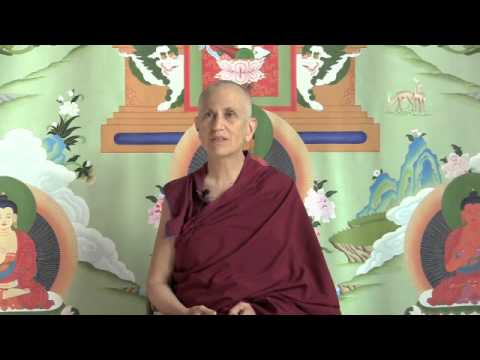What mental factors protect trust?
Part of a series of short Bodhisattva's Breakfast Corner talks on the topic of trust.
- Self-respect and consideration for others can protect us from breaking someone’s trust
- Mindfulness helps us remember our precepts and commitments and the direction we want to go in life
What mental factors protect trust? (download)
We’ve been talking about trust, and yesterday I was telling the story of someone who’s been having marital problems because of breaking the trust with his partner. We were saying that that also relates to the community, and when people do things outside the precepts or outside the guidelines that we’ve set up for the community, that that breaks trust also, because then people are going in different directions. Everybody else is going in one direction, and this individual is going in another direction, usually with attachment or anger.
Attachment
When we look in situations where trust is broken, so often it’s due to attachment or anger. We get attached to somebody—in the case of my friends, getting attached to somebody else and going off in a direction with that person; or you get attached to money or possessions, and you’re going off chasing that. When attachment takes us away from the things that we have committed ourselves to, then we often kind of rationalize and justify what we’re doing, saying, “I’m not really doing something outside of what everybody else is doing.” For example, like if somebody is embezzling money of the company they work at—that’s a break of trust. Or, I would say what the Wall Street bankers did was a break of trust. If you ask any of those people, I’m sure they wouldn’t say, “I broke trust, or I was embezzling or I was cheating,” because nobody likes to think that about themselves. They would say—they would have reasons for it: “Well, I’m working very hard for the company and they aren’t paying me enough, so it’s okay if I take that extra money because I actually deserve it. I’m not embezzling.” Or, “I’m a banker, I know the ins and outs of the system, I can use that perfectly well to my own advantage. There’s nothing illegal about it. It’s not attachment, I’m not doing anything wrong.”
Rationalizing
We can see that in our own selves, too, can’t we? We were talking yesterday about how when we break trust, we always have reasons, and rationalizations and justifications about how, it’s not really bad, what we’re doing. Right? It’s the same with everybody. So attachment is one thing that does that.
Anger
Anger can also make us break trust. We get really angry with somebody we’re close to or we’re working with, and then we want revenge, so we inflict harm on them. Perhaps sabotaging their projects, talking negatively about them behind their back, criticizing them to their face, turning everybody else in the group against them. We can very easily get angry with somebody—especially people we’re close to—and then we set up our own little network to get people on our side and turn them against that person and harm that person. That’s also a break of trust. Again, when we do that, we wouldn’t say, “I’m an evil cruel person who takes delight in making somebody suffer.” We wouldn’t say that about ourselves. We would say, “No, it’s their fault. They did that to me. I’m just doing what any sane person would do in response.” Wouldn’t we?
Honesty and mindfulness
What I’m getting at is how tricky our mind is, and how we can so easily breach trust with the people that we care about the most and the people with whom we interrelate with the most, simply by our own attachment and anger, and our ignorance in the whole process. That means we have to be really, really careful about what’s going on in our mind, and be very attentive, to remember the commitments we’ve made to people, to remember our precepts, to remember the direction we want to take in our life. In the case of my friends, to remember the marriage vows, and to keep those in mind, then to use those things to guide our behavior. When we see our mind wanting to go outside of that, to use the precepts to restrain the physical and verbal actions. Then to really look at our mind, and be honest with ourselves about what’s going on. That self-honesty can be very difficult, can’t it? That’s exactly what we need to do.
Introspective awareness
The more we are able to have that honesty and have that factor of introspective awareness, that knows what we’re doing and what we’re thinking and feeling, and have the mindfulness of our commitments and our precepts, the more those two factors are strong in our mind, then the easier it is to prevent the activities that break the trust to start with. There’re two other mental factors that we really want to exercise and develop too, that help us not to break trust. One is called a sense of integrity, and that’s where we abandon doing what’s destructive or counter-productive out of self-respect. Like, I don’t want to be the kind of person who does that. I’m looking at my mind, and with a snap of the fingers, I could easily be the person who does that, but I really don’t want to, because I have a sense of self-respect, a sense of my own integrity, I don’t want to go down that road. That mental factor that thinks like that helps us restrain.
Consideration for others
Another mental factor is consideration for others—thinking of the effects of our actions on other people. This is the mental factor that this man got after his wife found out about whatever was going on. It’s like, “My goodness, now I see what I did to her and how I caused her suffering.” If that mental factor had been stronger earlier on, when he saw himself getting attracted to somebody else, he would have said, “I care about my wife, and it’s a very important relationship, and I don’t want to hurt her feelings. I don’t want to destroy the trust and break up the marriage.”
The mental factors are already present in us
We see that all these mental factors we have in us already, but so many of them are not developed very well. Because of that, we just go down the well-worn road of attachment and anger. If we try and reinforce our mindfulness, our introspective awareness, checking up what’s going on inside, our sense of personal integrity, our consideration for others – if we develop these mental factors consciously in our daily life, in our meditation – then they can really help us prevent going down those roads. That prevents negative karma, that prevents problems in this life, it prevents lower rebirths, it prevents putting obstacles in our mind that prevent getting liberation and full awakening.
Sometimes it’s interesting, we hear the teachings on morality and ethical conduct, and it just sounds like some kind of topic up here, outside, but when we talk about it as breaking trust, then it really brings it much more into our heart, doesn’t it? We’ve all broken others’ trust, and we’ve all had our trust broken, and we know what that feels like. Knowing what that feels like, then we don’t want to do that to anybody else. Then that acts as an incentive to really develop these mental factors, and to keep our precepts well, because the precepts and the guidelines that we have for the community here really help us do that.
The five precepts
The five precepts for regular people on the outside with their jobs and their families—if people kept the five precepts, their lives would be so much happier! I think I mentioned to you another family—two other families, actually—who are writing me because the man has gone off and had an affair with somebody else and is now leaving their wives, and both families have children—young children. One has three children, and one has two children. Then people affect not only their spouses, but also their children, and not only their children, but also their in-laws. Everybody’s affected when something like this goes on. To really think about this beforehand, and try and get our act together.
I think that’s what’s so beautiful about the Buddhadharma, is that it shows us, these are the mental factors to strengthen; these are the actions to take care of and be careful not to do; here’s how to set up a daily meditation practice so you can be more aware of what’s going on inside of you. It’s very, very helpful, and really improves the quality of our lives, right now, as well as in the future.
Venerable Thubten Chodron
Venerable Chodron emphasizes the practical application of Buddha’s teachings in our daily lives and is especially skilled at explaining them in ways easily understood and practiced by Westerners. She is well known for her warm, humorous, and lucid teachings. She was ordained as a Buddhist nun in 1977 by Kyabje Ling Rinpoche in Dharamsala, India, and in 1986 she received bhikshuni (full) ordination in Taiwan. Read her full bio.


